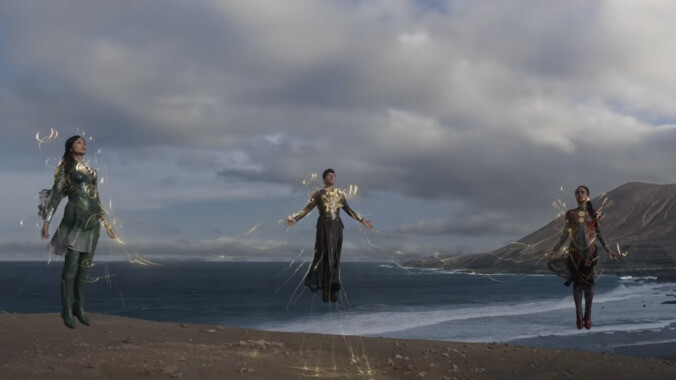When every new Marvel movie is “Marvel’s next big test,” how could the studio actually challenge itself?

When the trailer for Eternals dropped last week, it seemingly answered a big question: What would a Chloé Zhao Marvel movie look like? The director of the Oscar-winning Nomadland, a road movie about America’s ignored class of Amazon workers and roving population of people experiencing homelessness, was expected to bring a more human touch to big-screen superheroics. It was shot in-camera on actual locations, Marvel Studios President Kevin Feige reportedly proclaimed to a room full of executives. But to say the trailer is that far outside the realm of what we’ve seen from Marvel before is a bit of a stretch. Does this movie look so alien to the cinematic universe that contains Thor: Ragnarok and Guardians Of The Galaxy? Regardless of what Zhao has in store—whether it be a sprawling centuries-long epic in which characters echo through time a la Cloud Atlas or just the long road to baby Thanos—the trailer used footage that wouldn’t agitate even the Marvel Cinematic Universe’s most casual fan.
Despite the movie’s obvious aesthetic connection to the rest of Feige’s empire (not to mention its cast of A-list movie stars and beefed-up comedians, and its gold-encoded, computer-generated magic), it’s still the “next big test” for Marvel—“The Ultimate Test Of The Marvel Brand” as a Forbes headline put it. Everything is, and always was: The press has been identifying these supposed trials for Marvel since Marvel started making its own movies. Way back in 2008, Iron Man tested whether Robert Downey Jr.’s star-power could carry a B-list character. 2014, Guardians Of The Galaxy: Can a Troma veteran get the world into a talking raccoon no one’s ever heard of? (“Many are seeing the film as the first major test of the Marvel brand,” wrote the New York Post.) Avengers: Endgame tested whether or not Oscar voters would go for a Marvel movie (a headline from A.V. Club contributor Robert Daniels: “The Academy Awards’ Endgame Test”). Every movie is a new test for the studio, and each time they pass. They have nothing left to prove.

 Keep scrolling for more great stories.
Keep scrolling for more great stories.